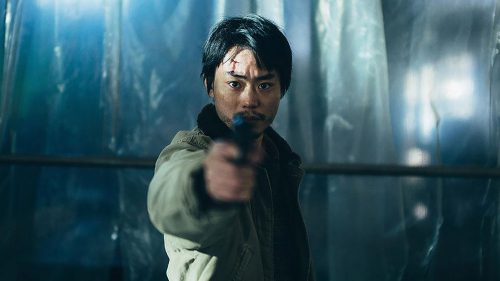
On the occasion of the screening of the film Cloud in the Out of Competition section, we met with the director and screenwriter Kurosawa Kiyoshi, an acclaimed Japanese author who has explored a wide range of cinematic genres.
Where did you draw inspiration for your new work?
Often my film making starts by thinking about its genre. This time it was “action.” Many action films are being made in Japan today, but most of them are fantasy stories that are far from reality, or dramas about people who come into contact with violence on a daily basis, such as police officers, the Self-Defense Forces, and yakuza. My aim was not that, but a story where ordinary people, people who live completely free from violence, end up in an extreme relationship where they “To kill and get killed.”

Ryosuke Yoshii is an enigmatic young man who seeks to enrich himself online at the expense of others, using insidious schemes and hiding his identity behind the nickname “Ratel.” One day, while engrossed in reading posts from haters against his alter ego, Ryosuke hears a v...
The reseller Yoshii, who uses the nickname Ratel, is caught in a vortex of hate as he crosses the line of legality by selling counterfeit goods; like in Pulse, the terror comes from the internet, but now it’s real, not supernatural. To what extent do you believe social media and digital interactions can lead to the brutalization of society?
The Internet itself is just a tool, and there is nothing malicious about it. If there’s a problem, it’s probably on the human side. The characters in the film have different circumstances, but they all live on the brink of destruction and are lonely. The Internet amplifies, exaggerates, and brings together the distortions and frustrations that have accumulated in the hearts of such people. I think what’s scary is when such people go beyond the internet environment and start emitting physical malice.

We might say that digital alienation generates monsters: the lack of contact and human relationships leads to a society incapable of interacting with others. Is there a way out of this artificial world?
I don’t know of the way out of this situation. The easiest thing to do in the early stages is to turn off your computer, but it seems like it’s already too late. Today, many frauds, crimes, and even wars are connected to the web environment. If there is any hope, it may seem that computers will also amplify and spread good intentions.
This year you directed the medium-length film Chime, presented at the Berlinale, the French remake of your 1998 film Hebi no michi, and now Cloud: how do you manage to be so prolific while maintaining such a high level of artistic quality?
I think filmmaking is always something adventurous and new and it’s not related to my career. In recent years, I shot my first self-remake in France, shot my first 45-minute feature film, and with the film Cloud, I worked with Masaki Suda, a top-class actor who represents modern Japanese cinema for the first time. It was very exciting and I was very happy. I can’t accomplish anything by myself, but the system of filmmaking itself constantly provides me with new experiences and encounters.